Fibre Circle CEO Edith Leeuta is a woman on a mission to advance the vision of zero waste to landfills in South Africa.
Fibre Circle is a government-recognised producer responsibility organisation for the paper and paper packaging sector of South Africa.
The organisation is entrusted by its members to implement their extended producer responsibility obligations, as mandated by the regulations passed in 2021.
What this means is that producers have the responsibility of reducing the amount of paper and paper packaging that end up in South Africa’s landfills.
This is where Fibre Circle comes into play, as it is their mission to implement this responsibility, work alongside their members to achieve their goals, and to ensure that post-consumer paper and paper is collected and recycled.
Leadership sat down for a chat with Fibre Circle CEO Edith Leeuta to find out more about her two years at the helm, what the future looks like for her organisation, how collaboration is vital, and the plight of women in the workplace.
Celebrating two years as CEO
When Leeuta accepted the role at Fibre Circle, she arrived with a plethora of experience from across various interesting roles—setting her up perfectly for the demands of being a CEO.
With a strong background in human resources and organisational development, what really made Leeuta stand out from the crowd was the important role she played in the founding of GR33N Africa, a not-for-profit organisation created to educate communities on sustainable environmental practices.
In her first two years at the helm of Fibre Circle, Leeuta believes that the environment she entered made it easy for her to settle in and start driving the important strategy of creating a greener South Africa.
”My experience so far has been extremely rewarding. I found an industry that’s quite vibrant. South Africa has a largely successful paper recycling economy, with a paper recovery rate of about 68%. The industry has many talented people with deep expertise, and is committed to diverting Paper & paper packaging from south Africa’s land fills. It also hasn’t been difficult for me to communicate the merit of why it is important for us to divert waste from landfill in South Africa,” Leeuta states.
”I am in a fortunate position where more and more people want to know their environmental footprint and what they can do to preserve south African fauna and flora. It’s all about creating opportunities and diversity in the circular economy.”
Since becoming CEO, Leeuta has gone on a drive to make sure that the scheme and its members have a common understanding of what needs to be achieved.
The strategy that she followed was to employ steering committees made up of representatives of different organisations that participate in setting the direction of the different products.
She explains: ”Since I have been on board, what we’ve done is pay a lot more attention to setting up those steering committees, putting together the agenda around what’s to be achieved—the common vision—and how we are going to go about achieving it. For me, this has created a shared vision and a common understanding.
”I think that we are in a position where the members of the scheme have a solid understanding of where we are as a scheme, what our collections and recycling rates are, the work we are doing, why we are responding in the way that we are responding to some of the challenges faced by the industry, and really just looking at all the members in the value chain at what their roles and responsibilities are in helping us further our vision.”
This approach has led to far more robust engagements with members, which in turn has helped to find a home for the paper and paper packaging categories that are deemed as ‘difficult to recycle’. Another aspect which Leeuta has enjoyed are her dealings with the government.
As the regulations are new and its adoption within the industry will take a bit of time, the help afforded to her from the Department of Forestry, Fisheries, and Environment has propelled the process along a lot quicker than may have been the case without their input.
”We’ve had quite a lot of progress with engaging with organisations that were not aware of the extended producer responsibility regulations. There’s been quite a lot of education and training around this, with both our member organisations and those who are not our members yet. I think that we’re making traction there and really sharing our expertise and knowledge around what needs to be done, but always soliciting the views of those who are participants in the industry,” she adds.
Collaboration is key
The end-goal for Leeuta is to see the end of paper and paper packaging finding its way into landfills, while creating as many jobs as possible along the way.
For this to happen, it may require interventions such as incentives for consumers, which speaks to collaboration by all stakeholders in this cause.
As a way to drive this point home, Leeuta borrows a phrase many of us are familiar with thanks to our national rugby team, the Springboks; we are always ‘Stronger Together’—not least in this task.
”Collaborative partnerships are vital in order for us to implement strategies that are going to see us have sustainable waste management practices in South Africa,” she insists. ”It really is a collaborative effort where we need to co-create solutions that are going to address our problems.
”An example of this is where packaging is imported into South Africa. You will find that the packaging is recyclable, but not in South Africa. So it has been interesting and quite informative for us from the Fibre Circle team to engage with our industry and speak about how it is we are going to address this packaging that enters our market which is not recyclable in South Africa.
”So it is important that collaboration from multiple stakeholders is in place, because I don’t think that there’s one organisation that may have a solution to our waste management challenges in South Africa. It certainly requires us to come together, different stakeholders—public, private, and ordinary citizens—in making sure that we realise our zero paper and paper packaging waste to landfill vision.”
A brighter future for all
”Our commitment remains unwavering, and our vision of a brighter future for all continues to guide our every endeavour,” Leeuta passionately asserts.
The dedication of her team and partners across the nation has been the driving force behind the transformative strides taken, yet Leeuta remains motivated by the path that lies ahead.
She envisions a country whose citizens are environmentally conscious and two recognise the value of a clean country. South Africans deserve a clean and dignified environment, which will also demonstrate a significant reduction in the environmental impact of paper production and consumption as a result of our research, innovative technologies, and responsible practices.
”The scope of Fibre Circle’s impact extends beyond environmental progress.” It also extends to communities across South Africa that should reap the tangible benefits of a more equitable society.” “Waste and pollution must be minimized, and local entrepreneurs have to be empowered to leverage recycled materials, resulting in the flourishing of small businesses and the revitalization of local economies. Such accomplishments will be underpinned by the core principles of the circular economy, which are central to Fibre Circle’s vision.”
Education and awareness must take centre stage in order for us to have a brighter future. Fibre Circle aims to cultivate a culture of sustainability from a young age through strategic partnerships with educational institutions, schools, and the media.
Leeuta proudly highlights that through Fibre Circle’s schools outreach program, children are nurtured with a deep understanding of the importance of reducing, reusing, and recycling. These environmentally conscious leaders of the future are poised to propel the country further towards a harmonious coexistence with the environment.
For a collaborative spirit to flourish in our bright future, government entities, corporations, non-profit organizations, and individuals must band together, sharing knowledge, resources, and inspiration. With this, the palpable sense of collective responsibility shall pervade society, reminding everyone that even the most insignificant actions can spark meaningful change.
Every individual, community, and corner of South Africa is set to shine brighter in the tapestry of sustainability, prosperity, and hope that is being woven. Edith Leeuta and Fibre Circle are at the forefront of this inspiring journey, sparking hope for a greener, more sustainable future.


